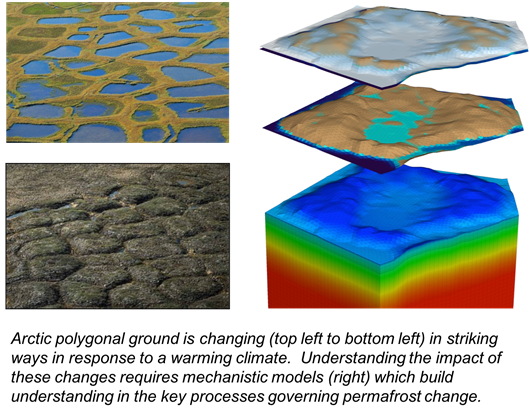EAST TENNESSEE GEOLOGICAL SOCIETY
February 2020 Meeting
Monday,
February 10, 2020
6:00 - 7:30 pm
Pellissippi State Technical Community College
10915 Hardin Valley
Road, Knoxville
J.L Goins Administration Building
Faculty/Staff Dining Room
FEBRUARY PRESENTATION
Building
process understanding through models: Exploring the interactions of hydrology,
geomorphology, and soil science in warming Arctic tundra
By
Ethan Coon
Research Scientist
Oak Ridge National Laboratory
Oak Ridge, Tennessee
Abstract

There are over 1500 gigatonnes of carbon stored in frozen ground throughout the Arctic, and warming climate is thawing this ground, offering the potential for decomposition and carbon release to the atmosphere. Understanding the fate of this carbon is made difficult by a complex set of processes; thermal hydrology, geomorphology, and subsurface soil science all come together to determine even basic questions such as, "Will the Arctic become wetter or drier in future climates?" and "What will be the rates and chemical forms of the permafrost carbon feedback?"
Mechanistic models are a key tool for understanding the interactions
of these processes. Only models allow us to fundamentally alter the
physics of a system, building understanding of causality, process
uncertainty, and process feedbacks. In this talk, I present the
story of how mechanistic models of permafrost polygonal ground have
evolved, providing new intuition into the key processes governing
changes in Arctic landscapes. I motivate the need for a new
paradigm for modeling, where model structure and process uncertainty
are addressed using the scientific method, and models are built
through the incremental addition of complexity and continually
evaluated with observations. I present a sequence of multi-scale
models. First, fine-scale, observation-informed models are used to
determine what processes govern local observations. This intuition
is used to design landscape scale models, and finally to
parameterize global Earth System Models to improve predictions of
the response of Arctic permafrost to climate change.
Biography
Dr. Ethan Coon is a computational
hydrologist in the Climate Change Science Institute at ORNL. He has
a background in applied and computational mathematics, and has done
research in applying computational methods for the Earth, especially
land surface and subsurface processes. Broadly he is interested in
process-based modeling, integrating models with data, and leverage
modeling to understand the processes that govern our changing
planet.
Most recently, he has developed coupled multi-physics models to
explore the water cycle in a variety of applications, including
Arctic permafrost evolution, watershed hydrology, flow and transport
of chemical species within watersheds, and feedbacks between
hydrology and other systems such as vegetation, geomorphology, and
soil physics. A process-based understanding of these complicated
systems often requires building understanding across scales, from
pore- to continuum- to Earth system scales.
To build this understanding, Dr. Coon builds a variety of
computational frameworks and software to allow easier and more
efficient development of geophysical models on high performance
computers. He is the principle developer of multiple open source
projects, most notably the Advanced Terrestrial Simulator (ATS), and
contributes to a variety of high performance computing frameworks
for hybrid architectures.
.
Page updated January 15, 2020 |